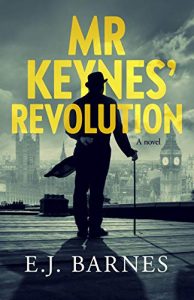When Emma Barnes, the author of Mr Keynes’ Revolution, got in touch to tell me about her new novel about an episode in the life of Keynes, I was a little sceptical although always happy to read a new book. Because it isn’t as if people haven’t tried to turn economics into fiction before. There are the very jolly Marshall Jevons crime novels, and Russ Roberts’ The Price of Everything and The Invisible Heart. However, these examples use fiction to teach readers economic concepts. Barnes’ novel is different: it’s a novel about a remarkable character in turbulent times. And a very good novel too, one I thoroughly enjoyed reading.
The book starts with Keynes storming out of the Versailles Treaty discussions in despair at the shape of the settlement, his arguments about the need not to make it impossible for Germany to recover, and writing The Economic Consequences of the Peace. It ends with his similar failure to win the argument about not returning Britain to the Gold Standard. In between, he meets ballerina Lydia Lopokova and eventually marries her. We are served some (Keynesian) economics, with a light touch. Ms Barnes is a Cambridge economics graduate; she makes Keynes’s arguments seem like common sense, and manages to drop hints about how The General Theory, published a decade later, took shape in Keynes’ mind.
But there is nothing of the worthy wholemeal about the economic thread in the novel. If you want the ins and outs there is no shortage of books about Keynes, from Skidelsky’s magisterial biography (in one volume or three) to more recent examples such as Richard Davenport’s Universal Man or Backhouse and Bateman’s Capitalist Revolutionary. The point of Mr Keynes’ Revolution is the story – the Bloomsbury background (they all emerge as dreadful people), and above all the unlikely romance. As I read, I thought the book would make a terrific film or TV series, and the afterword admits it was first conceived as a film script. It also promises a sequel. I look forward to it!

